ERSC 180
American Military University
All 42 results
Sort by
ERSC 180 Weeks exam Quiz's 100%CORRECT AND VERIFIED STUDY QUESTIONS,ANSWERS 2024 updated
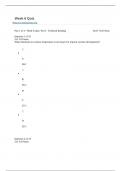
-
ERSC 180 Week 8 Study Week 6 Quiz Return to Assessment List Part 1 of 4 - Week 6 Quiz: Part I
- Exam (elaborations) • 24 pages • 2024
- Available in package deal
-
- $8.49
- + learn more
Question 1 of 33 3.0/ 3.0 Points What minimum sea surface temperature is necessary for tropical cyclone development? A. 30oC B. 25oC C. 27oC D. 32oC Question 2 of 33 3.0/ 3.0 Points When is the Atlantic hurricane season? A. May through September B. July through Oct
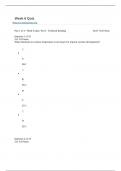
-
ERSC 180 Week 6 Quiz /Week 6 Quiz Return to Assessment List/Part 1 of 4 - Week 6 Quiz: Part I
- Exam (elaborations) • 24 pages • 2024
- Available in package deal
-
- $9.49
- + learn more
3.0/ 3.0 Points What minimum sea surface temperature is necessary for tropical cyclone development? A. 30oC B. 25oC C. 27oC D. 32oC Question 2 of 33 3.0/ 3.0 Points When is the Atlantic hurricane season? A. May through September B. July through October C. June through November D. August through December Rationale: June through November is when the highest probability of warm and moist air would rise from the ocean where it can encounter ...
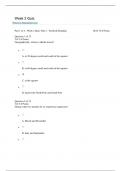
-
ERSC 180 Week 2 Quiz Return to Assessment List Part 1 of 4 - Week 2 Quiz: Part I
- Exam (elaborations) • 20 pages • 2024
- Available in package deal
-
- $9.49
- + learn more
Question 1 of 33 3.0/ 3.0 Points Geographically, where is albedo lowest? • A. at 30 degrees north and south of the equator • B. at 60 degrees north and south of the equator • C. at the equator • D. nearest the North Pole and South Pole Question 2 of 33 3.0/ 3.0 Points During what two months do we experience equinoxes? • A. March and December • B. June and September • C. December and June • D. March and September Question 3 of 33 3.0/ 3.0 Points Geographica...
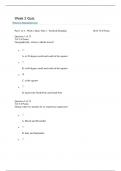
-
ERSC 180 Week 3 Study LATEST TESTBANK LATEST 202,QUESTIONS AND ANSWERS
- Exam (elaborations) • 20 pages • 2024
- Available in package deal
-
- $8.49
- + learn more
Question 1 of 33 3.0/ 3.0 Points Geographically, where is albedo lowest? • A. at 30 degrees north and south of the equator • B. at 60 degrees north and south of the equator • C. at the equator • D. nearest the North Pole and South Pole Question 2 of 33 3.0/ 3.0 Points During what two months do we experience equinoxes? • A. March and December • B. June and
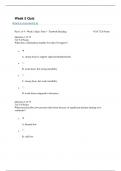
-
ERSC 180 Week 5 Study Week 5 Quiz Return to Assessment List Part 1 of 4 - Week 5 Quiz: Part I -
- Case • 19 pages • 2024
- Available in package deal
-
- $9.49
- + learn more
Week 5 Quiz Return to Assessment List Part 1 of 4 - Week 5 Quiz: Part I - Textbook Reading 45.0/ 72.0 Points Question 1 of 33 3.0/ 3.0 Points What does a Richardson number less than 30 suggest? • A. strong shear to support supercell thunderstorms • B. weak shear, but strong instability • C. strong shear, but weak instability • D. weak shear compared to buoyancy Question 2 of 33 3.0/ 3.0 Points What term describes low pressure that forms because of significant daytime heat...
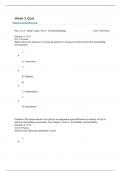
-
ERSC 180 Week 3 Study Week 3 QuizReturn to Assessment ListPart 1 of 4 - Week 3 Quiz: Part I
- Exam (elaborations) • 24 pages • 2024
- Available in package deal
-
- $9.49
- + learn more
Part 1 of 4 - Week 3 Quiz: Part I - Textbook Reading 54.0/ 72.0 Points Question 1 of 33 0.0/ 3.0 Points What reduces the buoyancy of rising air parcels by mixing in cooler air from the surrounding environment? A. convection B. adiabatic C. condensation D. entrainment Feedback:The displacement of air parcels are dependent upon differences in density of the air and the surrounding environment. See Chapter 5, Part C: Air Stability and Instability. Question 2 of 33 3....
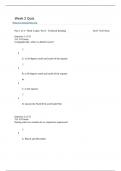
-
ERSC 180 Week 3 Quiz 100%CORRECT AND VERIFIED STUDY QUESTIONS,ANSWERS
- Exam (elaborations) • 24 pages • 2024
- Available in package deal
-
- $9.49
- + learn more
Week 2 Quiz Return to Assessment List Part 1 of 4 - Week 2 Quiz: Part I - Textbook Reading 66.0/ 72.0 Points Question 1 of 33 3.0/ 3.0 Points Geographically, where is albedo lowest? A. at 30 degrees north and south of the equator B. at 60 degrees north and south of the equator C. at the equator D. nearest the North Pole and South Pole Question 2 of 33 3.0/ 3.0 Points During what two months do we experience equinoxes? A. Marc
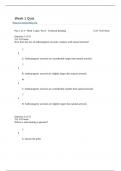
-
ERSC 180 W1 Quiz Week 1 Quiz Return to Assessment List
- Exam (elaborations) • 23 pages • 2024
-
- $9.49
- + learn more
Part 1 of 4 - Week 1 Quiz: Part I - Textbook Reading 72.0/ 72.0 Points Question 1 of 33 3.0/ 3.0 Points How does the size of anthropogenic aerosols compare with natural aerosols? A. Anthropogenic aerosols are considerably larger than natural aerosols. B. Anthropogenic aerosols are slightly larger than natural aerosols. C. Anthropogenic aerosols are considerably smaller than natural aerosols. D. Anthropogenic aerosols are slightly larger than natural aerosols. Question...
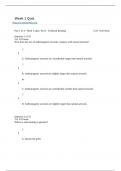
-
ERSC 180 W1 Quiz Questions & Answers (Latest 2024 / 2025).
- Case • 23 pages • 2024
-
- $8.49
- + learn more
Week 1 Quiz Return to Assessment List Part 1 of 4 - Week 1 Quiz: Part I - Textbook Reading 72.0/ 72.0 Points Question 1 of 33 3.0/ 3.0 Points How does the size of anthropogenic aerosols compare with natural aerosols? A. Anthropogenic aerosols are considerably larger than natural aerosols. B. Anthropogenic aerosols are slightly larger than natural aerosols. C. Anthropogenic aerosols are considerably smaller than natural aerosols. D. Anthropogenic aerosols are slightly...

How did he do that? By selling his study resources on Stuvia. Try it yourself! Discover all about earning on Stuvia


